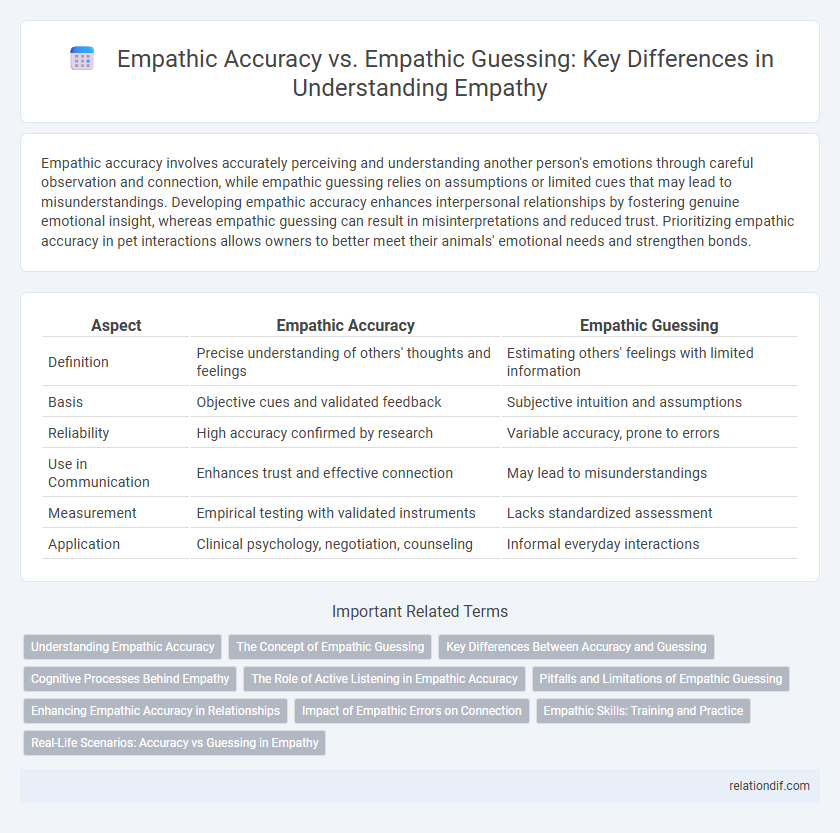Empathic accuracy involves accurately perceiving and understanding another person's emotions through careful observation and connection, while empathic guessing relies on assumptions or limited cues that may lead to misunderstandings. Developing empathic accuracy enhances interpersonal relationships by fostering genuine emotional insight, whereas empathic guessing can result in misinterpretations and reduced trust. Prioritizing empathic accuracy in pet interactions allows owners to better meet their animals' emotional needs and strengthen bonds.
Table of Comparison
| Aspect | Empathic Accuracy | Empathic Guessing |
|---|---|---|
| Definition | Precise understanding of others' thoughts and feelings | Estimating others' feelings with limited information |
| Basis | Objective cues and validated feedback | Subjective intuition and assumptions |
| Reliability | High accuracy confirmed by research | Variable accuracy, prone to errors |
| Use in Communication | Enhances trust and effective connection | May lead to misunderstandings |
| Measurement | Empirical testing with validated instruments | Lacks standardized assessment |
| Application | Clinical psychology, negotiation, counseling | Informal everyday interactions |
Understanding Empathic Accuracy
Empathic accuracy refers to the precise ability to accurately infer another person's thoughts and feelings, supported by cognitive empathy and social intuition. Unlike empathic guessing, which relies on assumptions or stereotypes, empathic accuracy uses observed behavioral cues and emotional context to enhance interpersonal understanding. This skill is critical in improving communication, conflict resolution, and building trust within personal and professional relationships.
The Concept of Empathic Guessing
Empathic guessing involves making intuitive assumptions about another person's thoughts or feelings based on limited information rather than precise understanding. This process relies on generalizations and stereotypes, which can lead to inaccuracies compared to empathic accuracy, where individuals correctly identify specific emotions or perspectives. Although empathic guessing may facilitate quick social interactions, it often sacrifices depth and accuracy in emotional understanding.
Key Differences Between Accuracy and Guessing
Empathic accuracy involves correctly identifying another person's thoughts and feelings based on observable cues, supported by psychological research demonstrating its link to improved social interactions and emotional intelligence. Empathic guessing, in contrast, relies on assumptions or stereotypes without sufficient evidence, often leading to misunderstandings or inaccurate perceptions of others' mental states. Key differences include the reliance on objective information in empathic accuracy versus subjective inference in empathic guessing, influencing the quality and outcome of interpersonal communication.
Cognitive Processes Behind Empathy
Empathic accuracy involves accurately understanding another person's thoughts and feelings through careful observation and cognitive perspective-taking, while empathic guessing relies more on assumptions and heuristics without full cognitive engagement. Cognitive processes like theory of mind, attention to social cues, and executive functioning play crucial roles in enhancing empathic accuracy. In contrast, empathic guessing often results from limited cognitive resources or biases that hinder precise emotional comprehension.
The Role of Active Listening in Empathic Accuracy
Active listening significantly enhances empathic accuracy by enabling individuals to accurately interpret and understand the emotions and perspectives of others through focused attention and verbal feedback. Research shows that active listening skills, including paraphrasing and asking clarifying questions, reduce misunderstandings and improve the precision of empathic judgments. This heightened accuracy contrasts with empathic guessing, which relies more on assumptions and often leads to less reliable emotional insight.
Pitfalls and Limitations of Empathic Guessing
Empathic guessing often leads to inaccurate interpretations due to reliance on stereotypes and assumptions rather than genuine understanding of others' emotions. This approach can result in misunderstandings and diminished trust, as individuals may misread subtle emotional cues or overlook contextual factors influencing feelings. Limitations of empathic guessing highlight the need for active listening and validation to improve emotional connection and communication accuracy.
Enhancing Empathic Accuracy in Relationships
Enhancing empathic accuracy in relationships involves improving the ability to accurately perceive and understand others' emotions, thoughts, and intentions through active listening and focused attention on nonverbal cues such as facial expressions and body language. Training in perspective-taking and emotional recognition techniques boosts empathic accuracy by reducing biases and assumptions common in empathic guessing, which relies heavily on subjective interpretation rather than objective understanding. Consistent practice of these skills strengthens emotional attunement and fosters deeper, more authentic interpersonal connections, optimizing relationship satisfaction and communication.
Impact of Empathic Errors on Connection
Empathic accuracy, the ability to precisely understand another person's thoughts and feelings, significantly strengthens interpersonal connection by fostering trust and validation. In contrast, empathic guessing often leads to misinterpretations that create emotional distance and misunderstandings, weakening relational bonds. These empathic errors impact communication quality, reducing emotional intimacy and increasing the likelihood of conflict within relationships.
Empathic Skills: Training and Practice
Empathic accuracy refers to the precise ability to understand others' thoughts and feelings through direct observation and interaction, while empathic guessing is an approximation based on assumptions or stereotypes. Training programs that emphasize active listening, emotional recognition, and perspective-taking exercises significantly enhance empathic accuracy over mere guessing. Consistent practice in real-life social contexts strengthens neural pathways associated with empathy, leading to improved interpersonal communication and emotional intelligence.
Real-Life Scenarios: Accuracy vs Guessing in Empathy
Empathic accuracy involves precisely understanding another person's thoughts and feelings in real-life scenarios, supported by behavioral cues and nuanced emotional signals. In contrast, empathic guessing relies on assumptions or stereotypes, often leading to misunderstandings or oversimplified interpretations. Research indicates that empathic accuracy enhances communication and relationship satisfaction, whereas reliance on guessing can reduce emotional connection and increase conflict.
empathic accuracy vs empathic guessing Infographic

 relationdif.com
relationdif.com